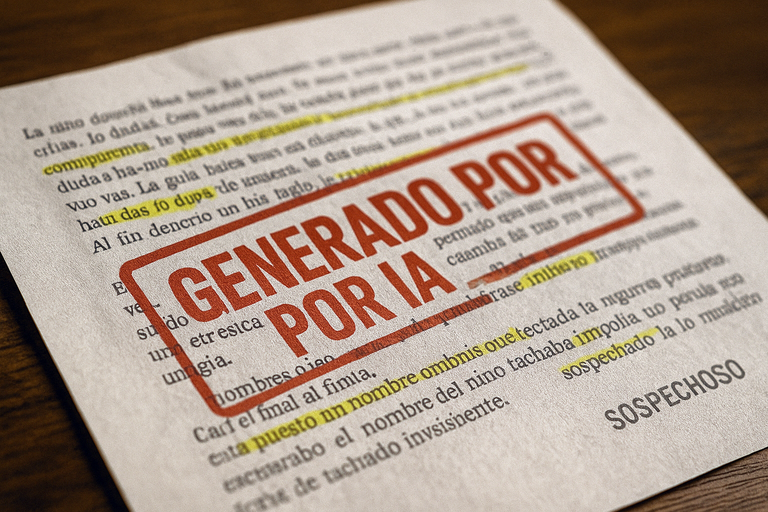 Imagen de mi autoría generada con ChatGPT
Imagen de mi autoría generada con ChatGPTLe llamaron “usuario de IA”.
Así, sin anestesia, ni hola, ni buen día, ni un “Oye, te leí”, ¡NO!, solo dejaron un mensaje diciendo que lo suyo no era suyo, que seguramente lo había escrito una máquina y que un modelo estadístico había encontrado patrones “sospechosos”.
Ronald su amigo, que estaba sentado a su lado, lo miró levantar la ceja en silencio como hace cuando algo le da rabia y risa al mismo tiempo, mientras leía el mensaje que decía:
“Parece que usaste herramientas para generar todo o parte de tu contenido con IA, o para editarlo, revisarlo o reformularlo. Evita usar herramientas de corrección gramatical para escribir, reformular o reescribir, ya que obtendrás una puntuación alta de IA y tu historia no será revisada".
Qué loco, pensó Akrros, ni siquiera le dieron chance de explicar que se había pasado un día entero dándole vueltas a esa idea.
Que había escrito en pijama y con una taza de café frío acompañándolo en su aventura literaria, que editó y reescribió, no porque un bot se lo sugirió, sino porque es de los que se quedan pegados a las palabras como si fueran tornillos oxidados, dándole vueltas y decidiendo si es la correcta o no.
Pero no había nada que hacer, porque, claro, el curador confía más en el detector de IA que en los ojos, o mejor dicho ni leyó, solo soltó la acusación como si tuviera una lupa mágica que ve más allá de lo visible, pero que en realidad solo repite lo que le dice un programa.
Y ahí está el punto más irónico de todo esto, lo señalaron de usar IA... usando otra IA.
O sea, para confirmar que él no era lo suficientemente humano al escribir, activaron un proceso que no tiene piel, ni sueños, ni dudas, que no sabe lo que es escribir con un nudo en la garganta o con los dedos temblando de emoción.
Ronald lo miró con esa cara que pone cuando algo le parece injusto pero inevitable, como si ya hubiera visto esto venir.
En ese momento Akrros entendió que no se trataba de lo que escribía o como lo escribía, sino de que sonara lo bastante torpe como para ser creíble.
Que si escribía de manera clara, concisa, con cierta estructura, ya era “sospechoso”. Como si pensar con claridad fuera un crimen o como si la única forma válida de sonar humano fuera escribir mal.
 Imagen de mi autoría generada con ChatGPT
Imagen de mi autoría generada con ChatGPTAsí que decidió hacer lo más humano que podía, se sentó, respiró hondo, y escribió este cuento.
No para convencerlos, ni para redimirse, lo hizo como quien deja una nota en una botella, sabiendo que quizá nadie lo lea con conciencia, pero igual lo lanza al mar.
Ronald leyó en silencio y al terminar no dijo mucho, solo murmuró, Qué ironía… justo esto, es lo que una máquina jamás va a entender.
Porque si la última palabra sobre si algo fue hecho por un ser humano la tiene una IA, entonces que quede claro que lo que importa no es el método ni la perfección…
Sino la verdad que habita en cada palabra escrita.

🇬🇧 English version
 Image of my own, generated with ChatGPT
Image of my own, generated with ChatGPTThey called him an AI user. Just like that, without any anesthesia, or hello, or good morning, or even a “Hey, I read you,” NO!, they just left a message saying that what they wrote wasn't theirs, that it had surely been written by a machine, and that a statistical model had found “suspicious” patterns. Ronald, his friend, sitting next to him, watched him raise his eyebrow silently, the way he does when something makes him angry and laugh at the same time, while reading the message that said: “It appears you used tools to generate all or part of your content with AI, or to edit, revise, or rephrase it. Avoid using grammar checking tools to write, rephrase, or rewrite, as you'll get a high AI score and your story won't be reviewed.” How crazy, Akrros thought. They didn't even give him a chance to explain that he'd spent an entire day mulling over that idea. That he'd written it in his pajamas with a cup of cold coffee accompanying him on his literary adventure, which he edited and rewrote, not because a bot suggested it, but because he's the kind of person who sticks to words like rusty screws, mulling them over and deciding whether it's the right one or not. But there was nothing to be done, because, of course, the curator trusts the AI detector more than his eyes, or rather, he didn't even read it at all; he just hurled the accusation as if he had a magic magnifying glass that sees beyond the visible, but in reality only repeats what a program tells him. And that's the most ironic point of all this: they accused him of using AI... using another AI. In other words, to confirm that he wasn't human enough when writing, they activated a process that has no skin, no dreams, no doubts, that doesn't know what it's like to write with a lump in your throat or with your fingers trembling with emotion. Ronald looked at him with that face he makes when something seems unfair but inevitable, as if he'd already seen this coming. At that moment, Akrros understood that it wasn't about what he wrote or how he wrote it, but about making it sound clumsy enough to be believable. That if he wrote clearly, concisely, with a certain structure, he was already "suspect." As if thinking clearly were a crime, or as if the only valid way to sound human was to write poorly. So he decided to do the most human thing he could: he sat down, took a deep breath, and wrote this story. Not to convince them, nor to redeem himself; he did it like someone who leaves a note in a bottle, knowing that perhaps no one will read it with conscience, but he still threw it into the sea. Ronald read silently, and when he finished, he didn't say much; he just murmured, "How ironic... this is precisely what a machine will never understand." Because if the final word on whether something was made by a human being rests with an AI, then let it be clear that what matters is not the method or the perfection... But the truth that dwells in every written word.
 Image of my own creation generated with ChatGPT
Image of my own creation generated with ChatGPT











